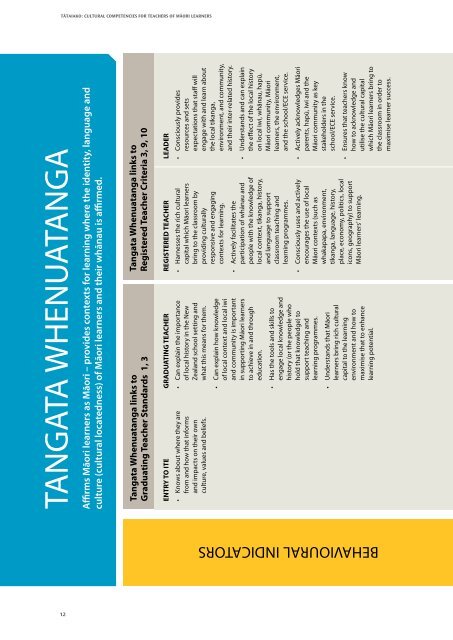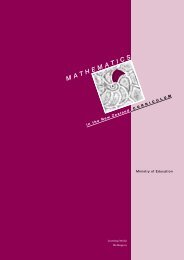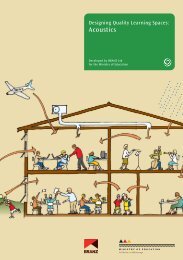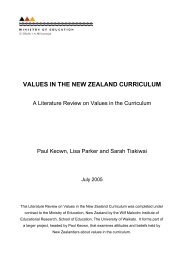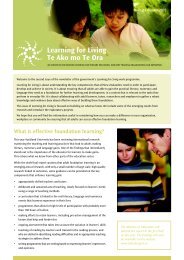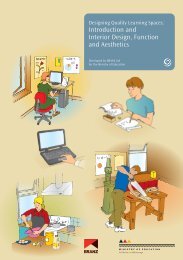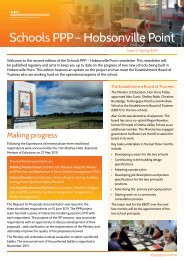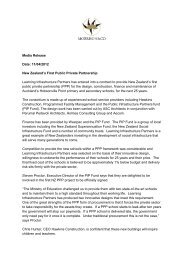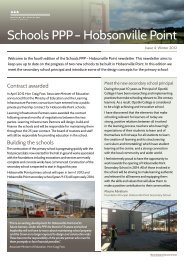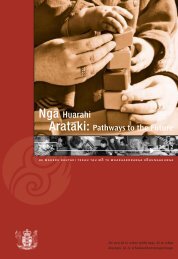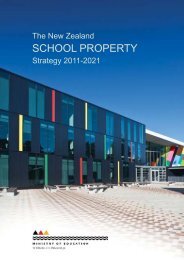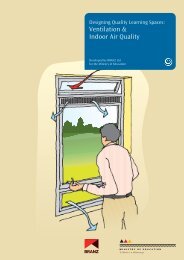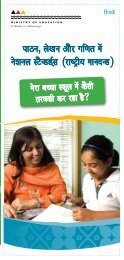Cultural Competencies for Teachers of Māori Learners - Ministry of ...
Cultural Competencies for Teachers of Māori Learners - Ministry of ...
Cultural Competencies for Teachers of Māori Learners - Ministry of ...
You also want an ePaper? Increase the reach of your titles
YUMPU automatically turns print PDFs into web optimized ePapers that Google loves.
TANGATA WHENUATANGA<br />
TÄTAIAKO: CULTURAL COMPETENCIES FOR TEACHERS OF MÄORI LEARNERS<br />
12<br />
Arms <strong>Māori</strong> learners as <strong>Māori</strong> – provides contexts <strong>for</strong> learning where the identity, language and<br />
culture (cultural locatedness) <strong>of</strong> <strong>Māori</strong> learners and their whānau is armed.<br />
Tangata Whenuatanga links to<br />
Registered Teacher Criteria 3, 9, 10<br />
Tangata Whenuatanga links to<br />
Graduating Teacher Standards 1, 3<br />
ENTRY TO ITE GRADUATING TEACHER REGISTERED TEACHER LEADER<br />
• Consciously provides<br />
resources and sets<br />
expectations that staff will<br />
engage with and learn about<br />
the local tikanga,<br />
environment, and community,<br />
and their inter-related history.<br />
• Harnesses the rich cultural<br />
capital which <strong>Māori</strong> learners<br />
bring to the classroom by<br />
providing culturally<br />
responsive and engaging<br />
contexts <strong>for</strong> learning.<br />
• Can explain the importance<br />
<strong>of</strong> local history in the New<br />
Zealand school setting and<br />
what this means <strong>for</strong> them.<br />
• Knows about where they are<br />
from and how that in<strong>for</strong>ms<br />
and impacts on their own<br />
culture, values and beliefs.<br />
• Can explain how knowledge<br />
<strong>of</strong> local context and local iwi<br />
and community is important<br />
in supporting <strong>Māori</strong> learners<br />
to achieve in and through<br />
education.<br />
• Understands and can explain<br />
the effect <strong>of</strong> the local history<br />
on local iwi, whānau, hapū,<br />
<strong>Māori</strong> community, <strong>Māori</strong><br />
learners, the environment,<br />
and the school/ECE service.<br />
• Actively facilitates the<br />
participation <strong>of</strong> whānau and<br />
people with the knowledge <strong>of</strong><br />
local context, tikanga, history,<br />
and language to support<br />
classroom teaching and<br />
learning programmes.<br />
• Actively acknowledges <strong>Māori</strong><br />
parents, hapū, iwi and the<br />
<strong>Māori</strong> community as key<br />
stakeholders in the<br />
school/ECE service.<br />
• Has the tools and skills to<br />
engage local knowledge and<br />
history (or the people who<br />
hold that knowledge) to<br />
support teaching and<br />
learning programmes.<br />
• Consciously uses and actively<br />
encourages the use <strong>of</strong> local<br />
<strong>Māori</strong> contexts (such as<br />
whakapapa, environment,<br />
tikanga, language, history,<br />
place, economy, politics, local<br />
icons, geography) to support<br />
<strong>Māori</strong> learners’ learning.<br />
• Ensures that teachers know<br />
how to acknowledge and<br />
utilise the cultural capital<br />
which <strong>Māori</strong> learners bring to<br />
the classroom in order to<br />
maximise learner success.<br />
• Understands that <strong>Māori</strong><br />
learners bring rich cultural<br />
capital to the learning<br />
environment and how to<br />
maximise that to enhance<br />
learning potential.<br />
BEHAVIOURAL INDICATORS


